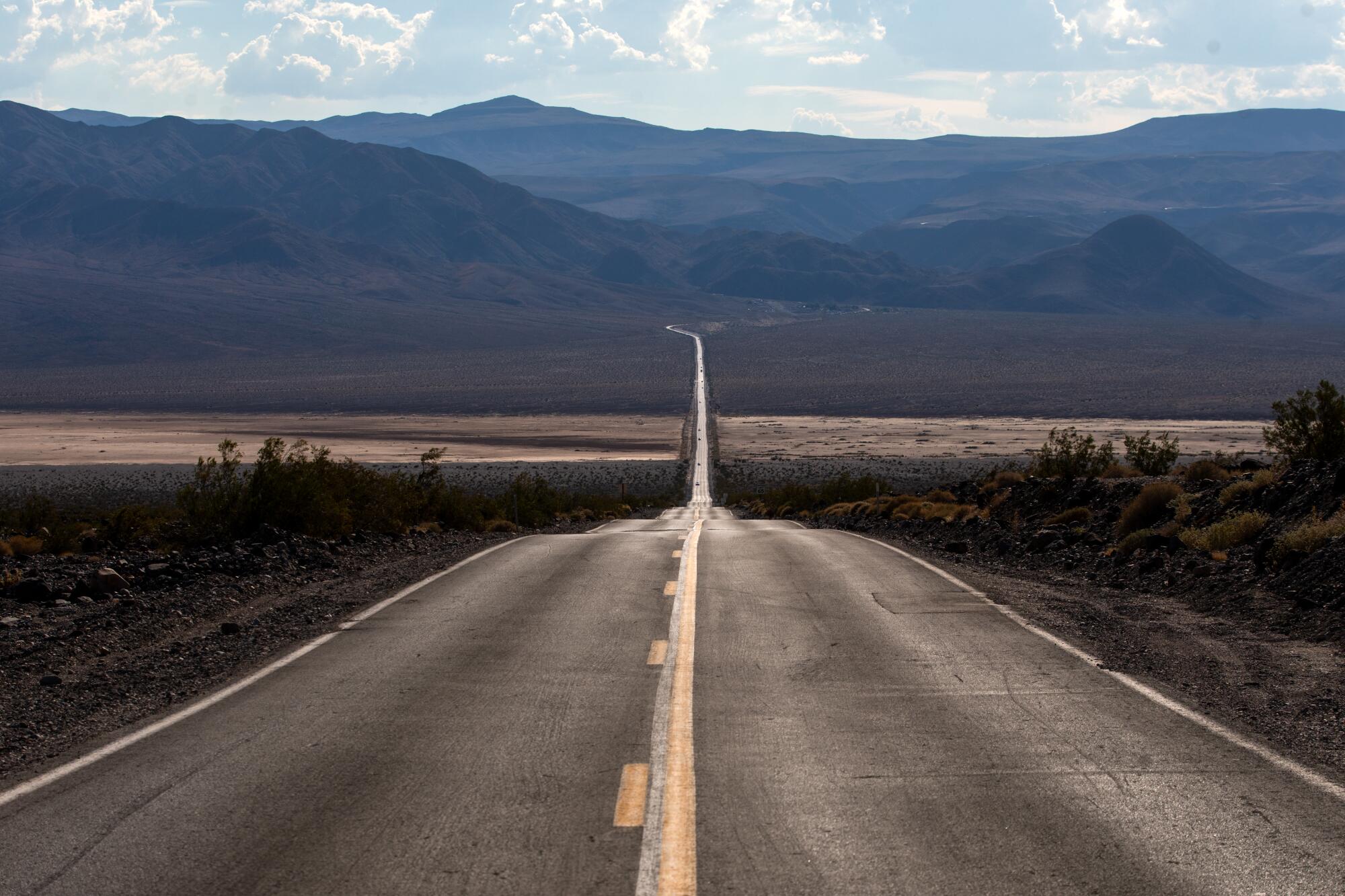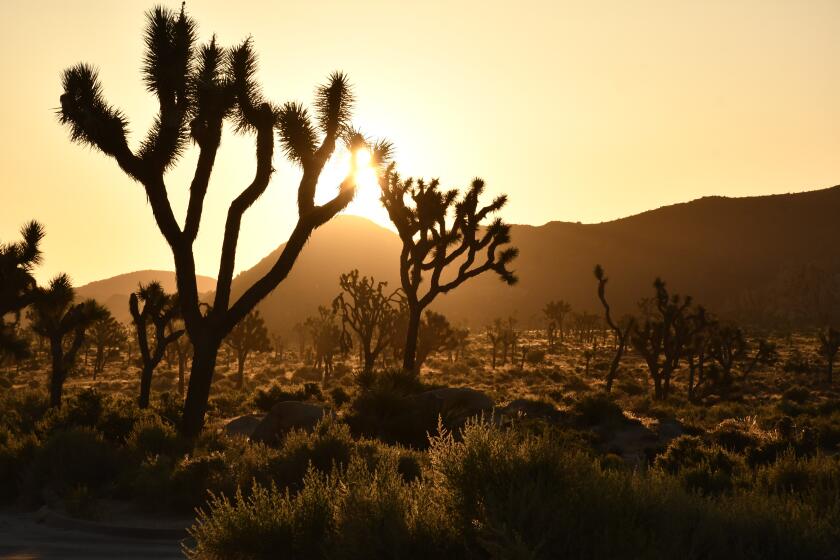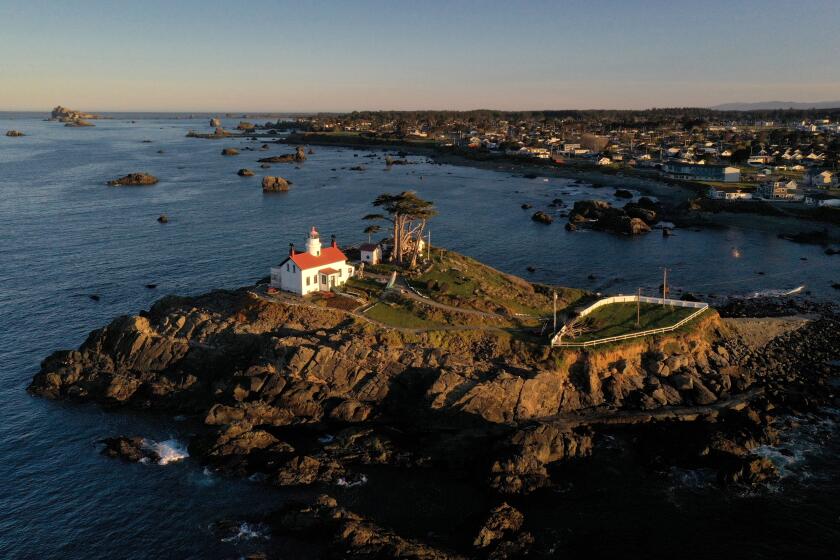
- Share via
“I need to get home to see my mother. She’s not in good health.”
These were the words of Randall, a homeless man I had never met before who walked up to me last summer while I was having coffee in a parking lot in southern New Mexico. It was a Saturday morning and he had two pitbull mixes, which he said were sisters from the same litter. I asked him to sit down in the back seat of my car, handing him water and an extra breakfast sandwich. He was sweating profusely and smelled of a man who had lived on the streets for more than two years, which he had.
Thus began a journey to the California-Nevada border through the night. In this journey I witnessed where people had gone during the massive economic dislocations over the last 20 years. They are scattered across the southwestern desert just off the road, encamped alone or with family and whatever they could throw into their cars, like Ukrainian refugees or Okies who fled the Dust Bowl in the 1930s.
In Los Angeles, disruptions kept me from my writing. But after a year in a cabin near Joshua Tree, coyotes keep me company and my fearlessness grows.
While we tend to think of homelessness as just an urban phenomenon, it most certainly is not. Federal counts suggest the number is rising steadily as housing stocks, including rural ones, dwindle in affordability. Of the approximately 582,000 homeless Americans, an estimated 30% of those accessing services live in rural and suburban areas, generally with less access to support than their urban counterparts.
As we loaded up the dogs, I told Randall I had just three rules: He had to take a shower and there would be no weapons or drugs. He quickly agreed.
Randall and the dogs were good company and fine passengers; all three slept like they had never gotten to before in their lives. A little at a time I learned his story. He was 33 years old, on the run from some other homeless men — not the police, he said. After 11 hours on the road, we topped the hills over the Las Vegas lights. But we still had two hours to go until Death Valley. My passenger slept.
As a young man, my grandfather experienced rural homelessness that eventually took him out West. He grew up in a huge Catholic family in Missouri, and when he turned 16 his mother took him to the train station. There she pressed a little money into his hand and wished him luck. A teenager, he rode the rails for years. Only the outbreak of World War I changed his fortune. Arriving in San Diego, he joined the U.S. Navy and drilled on the hot asphalt deck of the recruit depot. From there, he went to the Atlantic Fleet and as a seaman chased German U-boats. Afterward, he was fortunate enough never to be homeless again.
Like my grandfather, Randall grew up poor. He had landed in southern New Mexico because he was promised a job, but when he arrived the job vanished. His story was common: He drifted from family to friends, in and out of shelters, and then ended up on the street, the most dangerous option.
In cities such as Los Angeles, the number of people living unsheltered can overwhelm programs such as Project Homekey. Not so in Del Norte County.
At 1:30 a.m. I turned off the paved, narrow highway. We were strangers stuck together in the complete darkness of the desert. I made a crack: “This is how slasher films start.” Randall laughed heartily. Finally, we found his mother flashing her phone in the night. She and Randall could not have been nicer, thanking me and offering that I stay the night at her home. I said no thanks and drove off.
After dawn, I pulled into a gas station. Before I could even get out of the car, a woman ran toward me clutching a roll of cash, a purse and two tiny shopping bags. Speaking with what turned out to be a Ukrainian accent, she explained that she’d had a fight with her boyfriend. “I left him,” she said defiantly. She was headed to Phoenix, right on my way. I explained my policies about weapons and drugs and replied, “Come on.”
The Sonoran Desert flew by. Julia wasn’t much for small talk. After asking for permission, she chain-smoked and wept. She arrived in Arizona just before the Russian invasion of Crimea in 2014. Like Randall, she was 33 years old. And when I asked where I was taking her, she echoed his words: “I’m going to stay with my mother.”
Off state highway 74, we saw them: cars, trucks and campers scattered along the side of the road, like toys strewn by a careless child. The shoulders of the roads are just dirt in much of Arizona and Nevada, with few rest areas. Phoenix and other cities are kicking out entire homeless camps, so people come to the desert.
Some of the vehicles were the nice campers of winter nomads, but mostly they were faded, old cars with every worldly belonging duct taped together on the roof.
When I dropped Julia off, she thanked me and walked away. I thanked her. After all, she and Randall had shared with me the heartbreaking stories of American refugees.
I then found myself on Interstate 10, homeward bound to El Paso. Like my erstwhile travel companions, I was going to see my mother.
Richard Parker is the author of “The Crossing: War, Peace, Love and Death on the Rio Grande,” forthcoming in 2024.
More to Read
A cure for the common opinion
Get thought-provoking perspectives with our weekly newsletter.
You may occasionally receive promotional content from the Los Angeles Times.












